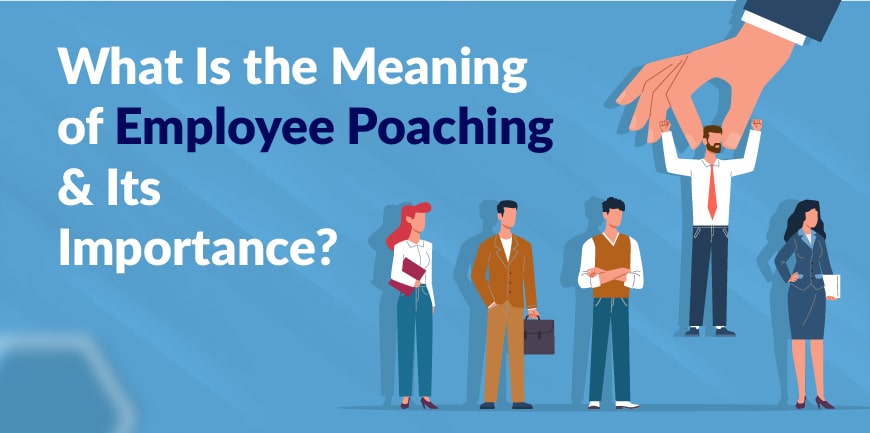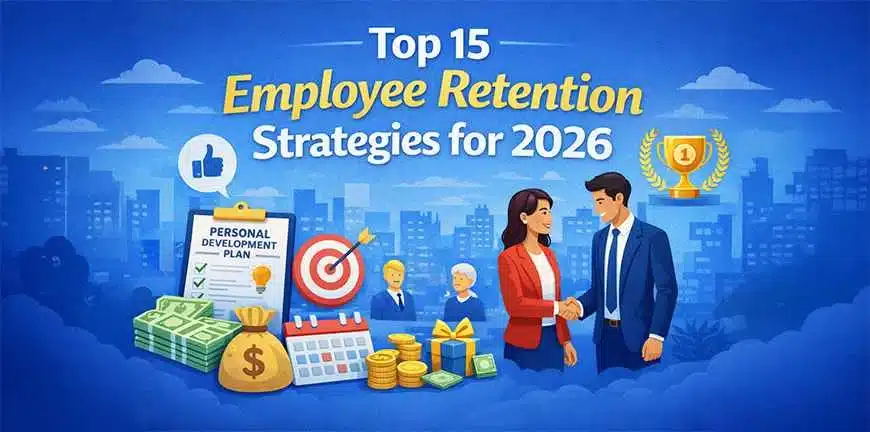
Inclusion VS Excellence? Rethinking Meritocracy and Diversity in Corporate India
08/05/2025
Hiring Freeze – Overview, Reasons, Examples and Effects
12/05/2025Introduction
Are you an individual with high in-demand skills? If so, then organizations are probably competing to get to you and have you onboard. If you are an individual with these extremely sought-after skills and more, not only do you have the attention of top companies but also get the power to negotiate your compensation. An organization may even poach employees from competitor companies to acquire top talent. While the term does make it sound illegal, employee poaching is perfectly legal. In this article, we will be seeing what employee poaching is and how it works.
What is Employee Poaching?
Employee poaching is a legal practice that involves an employer getting in touch with an employee at a competitor company to convince them to leave their current company and apply for a job at their organization.
Employee poaching is common within industries that are high in demand because the employee has the educational qualifications, skills and experience required for their business. While poaching employees is considered a legal recruitment tactic, it can be controversial and even become unethical if there is any aggression or deceptive practices involved.
The Importance of Understanding Employee Poaching
Understanding employee poaching is important for organizations as it impact their position in the market, decide their talent pipeline. By understanding the right legal way to poach employees, organizations can
- develop strategies to retain their best talent, like implementing measures to address concerns like competitive compensation, company cultures and more.
- minimize the negative consequences of talent loss by developing succession plans, training future leaders, and investing in employee development
- leverage the benefits of poaching and identify opportunities to attract talent from competitors and gain a competitive advantage.
- Understanding the legal implications of poaching employees can help companies avoid legal issues.
Understanding employee poaching is essentially about navigating through a competitive landscape and ensuring long-term success by retaining talent.
How Employee Poaching Works?
Employee poaching is carried out by organizations as a strategy to attract top talent, especially when it comes to recruiting for highly specialized roles. However, a recruiter as well as the organization must know how to do this ethically.
Poaching is more common in fields where employees need to have certain specific skills like coding, programming, analysis etc. Since these skills are in-demand, employers offer to pay employees with these skills more, with extra benefits, and pursue them till they are convinced to leave their current organization and join the latter.
For example, a recruiter contacts a high performing software developer in another computer systems organization and offer them a competitive pay along with incentives if they are ready to leave their current employer to take a position in the new company.
Not only does this provide an opportunity to the employee to make more money but also advance in their careers faster and work for top companies that would make a terrific addition to their resume.
The employee poaching process also follows the steps of a traditional recruitment process that involves
- Finding and engaging candidates through networking events, industry conferences, and personal recommendations from current employers.
- Recruiters proceed to reach out to these candidates on specific platforms like LinkedIn through personalized messages.
- While ensuring your communication is confidential with the employees also make sure you do not reveal any sensitive information about their current employer.
- Show empathy and understanding towards their current commitments and let them know that you as an employer place emphasis on their professional development. Build trust and credibility with the candidate.
- Provide them with a thorough overview of the recruitment process and give a realistic timeline. Do not exaggerate the role’s benefits and be clear about the challenges and opportunities that the position offers.
- Consider an overall value proposition and highlight opportunities for growth, work-life balance, company culture, benefits along with the handsome compensation.
- Clearly outline the job responsibilities, growth opportunities and demonstrate the company’s commitment to their professional growth.
Why Does Employee Poaching Happen?
Employee Poaching happens when companies are on the lookout for skilled candidates in specific industries, but the candidates are already employed in a competitor company. In order to attract these employees, companies often offer them better compensation, benefits, or career opportunities. Some of the key reasons why employee poaching happens are-
- Shortage of skilled individuals for specific roles leading companies to fight for them with competitor companies in an effort to poach them
- Employees are enticed with better compensation, benefits by a competitor company to pursue them to switch.
- Companies may poach employees to fill specific skill gaps and maintain a competitive edge in the industry
- Poaching employees from a competitor company comes with an advantage of the candidates already having the right knowledge and experience that new recruits may lack.
- On the unethical side, poaching could be a move to disrupt a competitor’s operations and weaken their talent pool.
- Modern technologies often create a demand for specific skills, making companies seek out individuals with skills who are already working with competitors.
Is Poaching Employees Illegal or Unethical?
Whether poaching employees is illegal or not is debatable as it depends on the circumstances under which the employee is being poached. It also depends on who you are asking. For example, if you are asking a manager who loses their top performer to poaching, they would probably tell you it is illegal as well as unethical because they just lost their best talent.
However, employee poaching is not illegal, but it does come with certain legal implications. These implications may arise if an employee is poached from a competitor with whom they have signed a non-solicitation agreement and are breaking it now.
A non-solicitation agreement, usually between an employer and employee, prohibits the employee from maintaining professional contact with the employer’s clients and customers upon leaving the company.
Most employers include a non-compete clause in the employment contract to prevent employees from joining competitors for a period of time after leaving the company. A no-poaching agreement is signed between two companies stating that the two competing companies are not to poach each other’s employees.
Poaching can be considered fair if it is based on offering better opportunities, compensation, or work environment.
Strategies Companies Use to Prevent Poaching
Companies can employ certain anti-poaching methods to retain their top talent. Some of the strategies include-
1. Focus on enhancing employee satisfaction and engagement
- Offer employees compensation and benefits that are industry-standard, reducing the risk of them feeling attracted to competitor offers
- Provide them with opportunities for growth and development by offering them the right training and mentoring.
- An inclusive and engaging workplace environment goes a long way in making your employees feel satisfied and appreciated, helping to retain them.
- Identify areas for improvement and address potential issues before they escalate.
- Address concerns of employees with immediate effect to highlight your commitment to towards their work, safety, and security.
2. Strengthen employee loyalty
- Implement programs that reward employees for their contributions and achievements boosting their morale
- Provide them with flexible working arrangements promoting a healthy work life balance and reducing burnout
- Involve employees in the decision-making process to make them feel connected to the organisation and increase their accountability.
3. Legal Protection
- Have your employees sign a non-compete agreements that include non-compete clauses in the contract restricting them from working for their competitors for a specific period after leaving the company.
- A non-compete agreement may also state that the employee cannot open their own competing business after terminating their employment
- Sign confidentiality agreements to protect sensitive company information to prevent sharing of trade secrets with competitors
- Companies can enter into no-poaching agreements with competitors and agree to not poach each other’s employees. It can keep the company from losing out on their best, most skilled employees. However, to prevent issues with using no-poach agreements, companies use non-compete agreements instead.
- A non-solicitation agreement can be signed between the employer and employee preventing them from soliciting clients or customers of their former employer after leaving the company.
While it is not possible to avoid employee poaching entirely, whether it is your company’s employees that are being poached or your company is the one poaching competitors’ employee, you can prepare yourself to handle it as well as possible. From being attuned to employee needs to setting contractual obligations against talent poaching, you can minimize the potential negative impacts of poaching on your organization and its workforce.
Frequently Asked Questions (FAQs)
1. What is Employee Poaching?
Employee poaching is a legal practice that involves an employer getting in touch with an employee at a competitor company to convince them to leave their current company and apply for a job at their organization.
2. How employee poaching works?
Employee poaching can happen over email, LinkedIn or through personal networking. Employees that are being poached are obviously passive job seekers but are looking to hear about positions that pay them well and offer better career opportunities. Poaching happens when an employer entices an employee working with a competitor with better pay, benefits, and growth opportunities.
3. Is employee poaching polite?
Employee poaching, while ethical, may not always be legal or polite for that matter. It involves recruiting employees from direct competitors or former employers, often leading to non-compete clause issues.
4. What should a company do when their employees are being poached?
When employees are being poached, companies should focus on strengthening their employee retention strategy. This includes reviewing compensation and benefits, addressing employee concerns, and creating a positive work environment. Implementing retention programs, fostering a strong company culture, and considering non-compete agreements can also help.
5. Is it legal to poach an employee?
It is considered legal to poach employees, however, it depends on whether the poached employee has signed an agreement with their current employer that includes a non-compete clause; or if there exists a no-poaching agreement between two companies. Otherwise, poaching may have legal consequences.
6. What are the options when dealing with non-compete issues?
Non-competes may be drafted in distinct ways to cover (or leave uncovered) various activities that may constitute “competition.” Employers should consider how to define the “business” of the company, the forbidden competitors or relevant industry, and the specific activities to be prohibited.
Contact Us For Business Enquiry

Rajkumar Shanmugam
Rajkumar Shanmugam is the Head of HR at ALP Consulting, bringing over 19 years of comprehensive HR leadership experience across India and international markets. His expertise spans talent acquisition, employee relations, performance management, compliance, and HR transformation. Rajkumar has a proven track record of driving people-centric initiatives, enhancing workplace culture, and aligning HR strategy with business goals. With extensive experience in US staffing operations and global mobility, he continues to lead organizational excellence through innovation and employee engagement.




